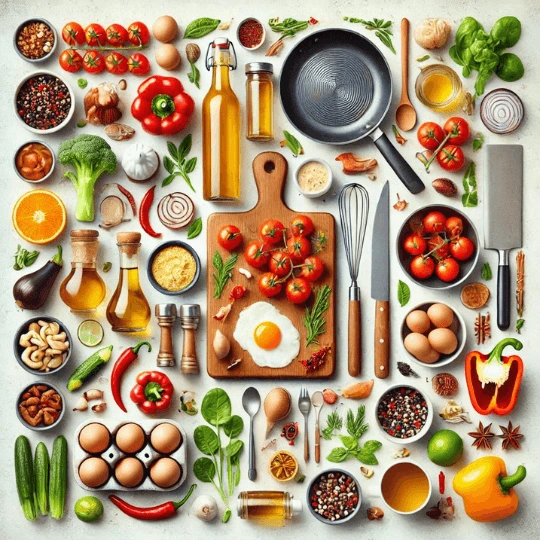Introduction
Cooking can be a fun and rewarding experience, but it can also be daunting for beginners. These essential cooking tips will help you build confidence in the kitchen, improve your skills, and create delicious meals with ease. Whether you’re just starting out or looking to refine your techniques, these tips are designed to make your cooking journey smoother and more enjoyable.
1. Read the Recipe Thoroughly
Before you start cooking, read the entire recipe from start to finish. This helps you understand the steps involved, the ingredients needed, and any special techniques required. It also allows you to prepare everything in advance, ensuring a smooth cooking process.
2. Organize Your Ingredients

Prepare all your ingredients before you start cooking. This process, known as “mise en place,” involves measuring, chopping, and arranging everything in an organized manner. It ensures you have everything ready and avoids last-minute scrambling.
3. Keep Your Knives Sharp

A sharp knife is safer and more efficient than a dull one. Invest in a good quality chef’s knife and keep it sharp by honing it regularly and sharpening it when needed. A sharp knife makes cutting and chopping easier and more precise.
4. Season as You Go
Add salt and pepper at different stages of cooking to build layers of flavor. Taste your food frequently and adjust the seasoning as needed. Proper seasoning can elevate a simple dish to something extraordinary.
5. Use Fresh Herbs

Fresh herbs add vibrant flavors and aromas to your dishes. Add them towards the end of cooking to preserve their freshness and potency. Experiment with different herbs to find your favorite combinations.
6. Don’t Crowd the Pan
When sautéing or frying, give your ingredients enough space in the pan. Crowding the pan traps steam and prevents browning, which can affect the texture and flavor of your food. Cook in batches if necessary.
7. Master the Art of Sautéing
Sautéing is a versatile cooking method that involves cooking food quickly in a small amount of oil over high heat. Heat the pan before adding oil, and cook ingredients in a single layer to ensure even cooking and browning.
8. Deglaze the Pan
After sautéing, add a liquid like wine, broth, or water to the hot pan to dissolve the browned bits stuck to the bottom. This technique, known as deglazing, creates a flavorful base for sauces and gravies.
9. Use a Thermometer

A food thermometer ensures your meat is cooked to the right temperature, preventing undercooking or overcooking. Different types of meat have different safe internal temperatures, so familiarize yourself with them.
10. Let Meat Rest
After cooking meat, let it rest for a few minutes before cutting into it. This allows the juices to redistribute, resulting in juicier and more flavorful meat. Cover it loosely with foil to keep it warm.
11. Learn to Make Stock
Homemade stock is a valuable ingredient that adds depth to soups, stews, and sauces. Save vegetable scraps, meat bones, and trimmings to make your own stock. Simmer them with water and seasonings for a rich, flavorful base.
12. Balance Flavors
A well-balanced dish has a harmonious blend of sweet, salty, sour, and bitter flavors. Taste your food frequently and adjust the seasoning to achieve the desired balance. A splash of acid, like lemon juice or vinegar, can brighten and enhance flavors.
13. Use the Right Cooking Oils
Different oils have different smoke points and flavors. Use olive oil for sautéing and roasting, and high-heat oils like canola or avocado oil for frying. Experiment with flavored oils, like sesame or chili oil, to add depth to your dishes.
14. Invest in Quality Cookware

Good-quality pots, pans, and baking sheets make a significant difference in cooking. Invest in a few essential pieces, such as a heavy-bottomed skillet, a large pot, and a baking sheet. They distribute heat evenly and last longer.
15. Don’t Skip the Prep Work
Chopping vegetables, marinating meat, and measuring ingredients in advance save time and reduce stress during cooking. Proper preparation allows you to focus on the cooking process and ensures everything runs smoothly.
16. Taste and Adjust
Taste your food frequently while cooking and adjust the seasoning as needed. A dish can change dramatically with a touch of salt, a pinch of sugar, or a splash of acid. Trust your palate and make adjustments to suit your taste.
17. Use the Right Cooking Method
Different ingredients require different cooking methods to bring out their best qualities. Learn the basics of roasting, grilling, baking, and steaming to expand your culinary repertoire. Choose the appropriate method for each ingredient.
18. Clean as You Go
Keeping your workspace clean and organized makes cooking more enjoyable. Clean up spills immediately, wash dishes as you go, and keep your countertop clutter-free. A tidy kitchen reduces stress and makes the cooking process smoother.
19. Experiment with Spices
Spices can transform a dish and introduce new flavors. Experiment with different spice combinations to find your favorites. Toast whole spices before grinding them to release their full aroma and flavor.
20. Know When to Stop
Overcooking can ruin a dish. Pay attention to cooking times and use visual and tactile cues to know when food is done. Trust your instincts and avoid overcooking to maintain the texture and flavor of your dishes.
21. Use a Timer
Set a timer to keep track of cooking times. This helps you avoid overcooking and ensures consistent results. Timers are especially useful for baking, roasting, and simmering.
22. Experiment with Recipes
Don’t be afraid to tweak recipes to suit your taste. Cooking is an art, and creativity is encouraged. Add your favorite ingredients, adjust the seasoning, or try a new cooking method to make the recipe your own.
23. Use Leftovers Creatively
Turn leftover ingredients into new dishes to reduce waste and save money. Use leftover chicken in salads, soups, or sandwiches. Transform cooked vegetables into frittatas or stir-fries. Get creative and find new ways to use leftovers.
24. Try New Ingredients
Exploring new ingredients and flavors can expand your culinary skills and introduce you to different cuisines. Visit local markets, try exotic spices, and experiment with unfamiliar ingredients to discover new favorites.
25. Have Fun and Enjoy the Process

Cooking should be an enjoyable experience. Embrace the process, experiment with new techniques, and savor the results. Cooking for yourself and others can be a rewarding and fulfilling activity. Enjoy the journey!
Conclusion
Cooking is a skill that improves with practice and patience. By following these essential tips, beginners can build a strong foundation and develop their culinary abilities. Remember, the key to becoming a great cook is to stay curious, keep learning, and enjoy the process. Happy cooking!


3 thoughts on “25 Essential Cooking Tips for Beginners”